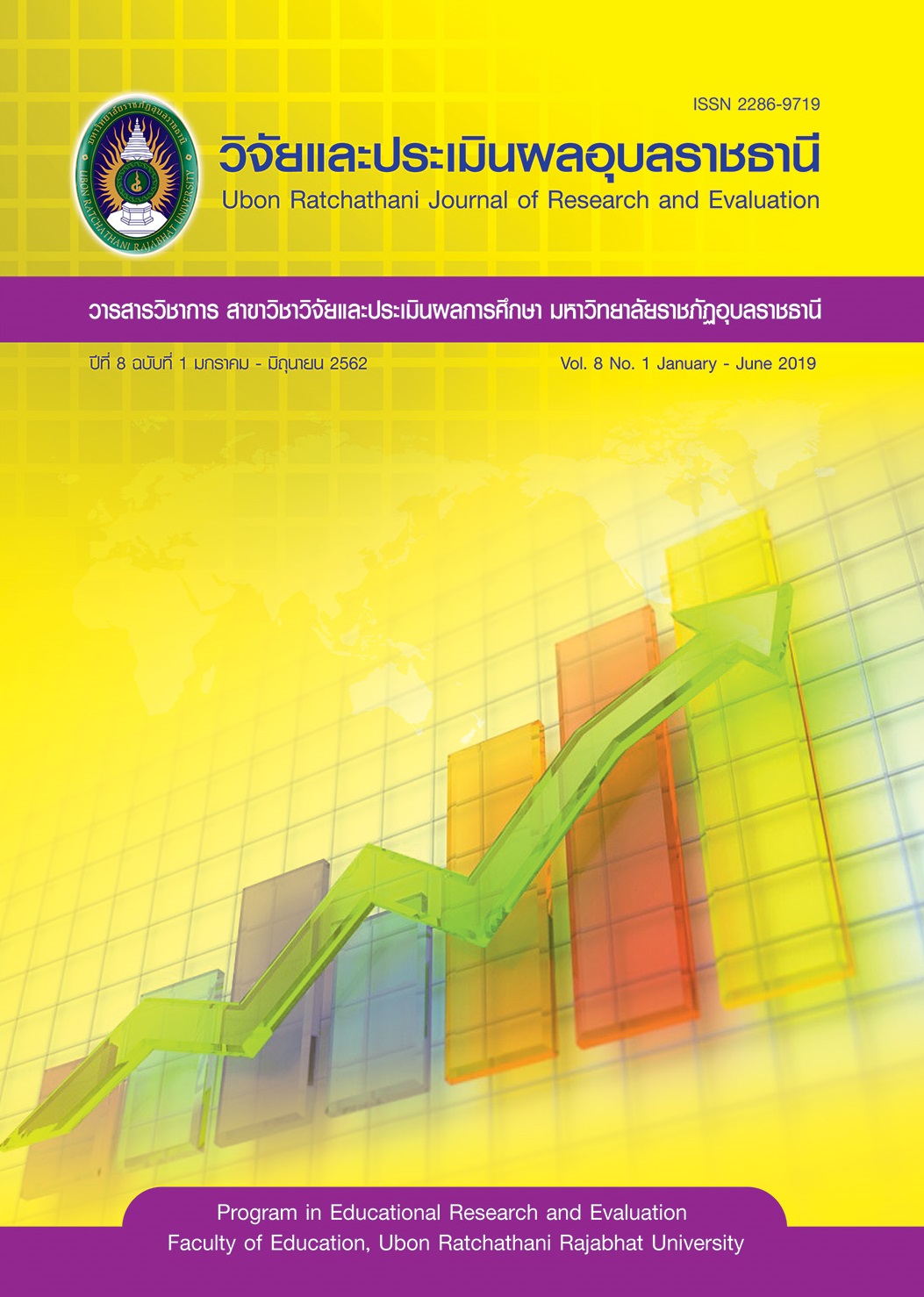Servant Leadership of School Administrators Affecting the School Culture of Schools for the Deaf under the Administrative Office of Special Education Bureau
Keywords:
Servant Leadership, Schools Culture, DeafAbstract
The purposes of this research were to: 1) study the level of servant leadership of the school administrators: 2) study the level of the school culture: 3) study the relationship between servant leadership of school administrators and the school culture: and 4) create the predictive equation of servant leadership of the school administrators affect the school culture. The sample of this research was 274 teachers who were simple random sampling. The data used by a 5 rating scale questionnaire which ask about servant leadership of the school administrators and ask about school culture. Data analysis used frequency, percentage, mean, standard deviation Pearson's correlation coefficient and stepwise multiple regression analysis.
The research finding were as follow:
- The overall servant leadership of the school administrators was at a high level.
- The overall school culture was at a high level.
- servant leadership of the school administrators and school culture had a positive relationship.
- Predictive equations of servant leadership that affecting the school culture comprised 3 factors which were empowerment (X2), humility (X4), and unselfishness (X3) at the statistical significance level .01 as follows:
Predictive equation in raw score:
= 1.962 + 0.240(X2) + 0.194(X4) + 0.111(X3)
Predictive equation in standard score:
= 0.374( ) + 0.279( ) + 0.172( )
References
Bunsit, R. (2010). The relationship between school culture and performance of teachers in primary schools under the Office of Udon Thani Educational (Master’s Thesis, department of Educational Administration). Udon Thani Rajabhat University, Udon Thani.
Chamratnaw, P. (2010). The school culture: A case study of Nonkun Witthayakhan Ratchamangkalapisek School under Chaiyaphum Educational Service Area Office 2 (Master’s Thesis, department of Educational Administration). Khonkaen University, Khonkaen. [in Thai]
Greenleaf, R.K. (1977). Servant leadership: A Journey into the Nature of Legitimate Power and Greatness. Mahwah, NJ: Paulist Press.
Kesorn, K. (2012). The relationship between organizational culture and school effectiveness under Pathumthani Primary Educational Service Area Office 1 (Master’ s Thesis, department of Educational Administration Technology). Rajamangala University of Technology Thanyaburi, Pathum Thani. [in Thai]
Krejcie, R.V. & Morgan, D.W. (1970). Determining sample size for research activities. Educational and Psychological Measurement, 30(3), 607-610.
Ministry of Education. (1999). National Education Act B.E. 2542. Bangkok: Printing Teachers Council of Thailand, Lat Phrao. [in Thai]
Ministry of Education. (2002). National Education Act (No.2) B.E. 2545. Bangkok: Printing Teachers Council of Thailand, Lat Phrao. [in Thai]
Ministry of Education. (2010). National Education Act (No. 3) B.E. 2553. Bangkok: Printing Teachers Council of Thailand Lat Phroa. [in Thai]
Muangphuan, W. (2008). The relationship between culture, academia and learning organization of educational institutions primary school under the Office of Nong Khai Educational Service Area (Master’s Thesis, department of Educational Administration). Udon Thani Rajabhat University, Udon Thani. [in Thai]
Office of the Education Council. (2017). National Education Plan B.E. 2560-2579. Bangkok: Prikwarn Graphic. [in Thai]
Office of the Teacher Civil Service Commission. (2001). Toward the Teaching Profession. Bangkok: Thammasat University. [in Thai]
Organ, D. (1990). The motivational basis of organizational citizenship behavior. Research in Organizational Behavior, 12(1), 43-72.
Patterson, J.L. (1986). Productive school systems for a nonration world. Alexandria, VA: Association for Supervision and Curriculum Development.
Patterson, J.L. (2003). Servant leadership: A theoretical model. (Doctoral Dissertation), Regent University, Virginia Beach, VA: USA.
Saleathip, S. (2013). The Relationship between servant leadership styles of school administrators and Learning Achievement of Schools under Udon Thani Primary Educational Service Area Office 1 (Master’s Thesis, department of Educational Administration). Loei Rajabhat University, Loei. [in Thai]
Sendjaya, S., & James, C.S. (2002). Servant leadership: Its origin, development, and application in organizations. Journal of Leadership and Organization Studies, 9(2), 1-11.
Spears, L.C. (2004). Practicing servant-leadership. Leader to Leader, (34), 7-11,
Srithong, A. (2015). Servant leadership of executives affecting school culture of affiliated schools under the Secondary Educational Service Area Office 9 (Master’s Thesis, department of Educational Administration). Nakhon Pathom Rajabhat University, Nakhon Pathom. [in Thai]
Ubonchai, T. (2013). The relationship between the servant leadership style of school administrators and operations school support system for students under Loei Primary Educational Service Area Office 1 (Master’s Thesis, department of Educational Administration). Loei Rajabhat University, Loei. [in Thai]
Winston, B.E. (2004). Servant leadership at heritage bible college: A Single-case study. Leadership & Organization Development Journal, 25(7), 600-617,
Yanasuthi, S. (2008). Development of guidelines for participation in academic work of the basic education school board under the Office of Nakhon Nayok Educational Service Area by using the empowerment (Master’s Thesis, department of Educational Administration). Phranakhon Si Ayutthaya Rajabhat University. [in Thai]
Downloads
Published
How to Cite
Issue
Section
License
1. บทความที่ตีพิมพ์ในวารสารนี้ได้มีการตรวจสอบการลอกเลียนงานวรรณกรรมแล้ว ไม่เกินร้อยละ 25
2. บทความที่ตีพิมพ์ในวารสารนี้เป็นข้อคิดเห็น ข้อค้นพบของผู้เขียนบทความ โดยผู้เขียนบทความต้องเป็นผู้รับผิดชอบต่อผลทางกฎหมายใด ๆ ที่อาจเกิดขึ้นจากบทความนั้น ๆ
3. บทความ ข้อมูล เนื้อหา รูปภาพ ฯลฯ ที่ได้รับการตีพิมพ์ในวารสารวิจัยและประเมินผลอุบลราชธานี ถือเป็นลิขสิทธิ์ของวารสารวิจัยและประเมินผลอุบลราชธานี หากบุคคลหรือหน่วยงานใดต้องการนำทั้งหมดไปเผยแพร่ต่อหรือเพื่อกระทำการใดๆ จะต้องได้รับอนุญาตเป็นลายลักษณ์อักษรจากวารสารวิจัยและประเมินผลอุบลราชธานีก่อนเท่านั้น และจะต้องมีการอ้างอิงวารสารวิจัยและประเมินผลอุบลราชธานี ฉบับนั้น ๆ ด้วย






